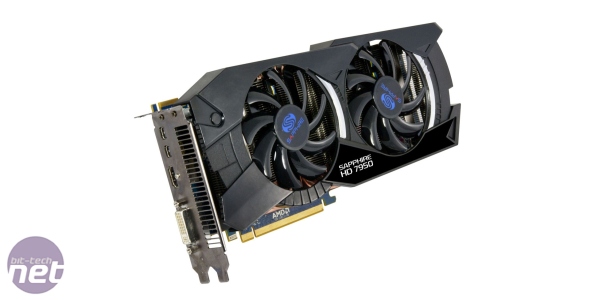
Performance Analysis
While the increased clock speed of the HD 7950 3GB With Boost undoubtedly resulted in tangible performance increases across the board, as ever, it depends which games we're considering as to whether the price hike is worth it over the stock card. Battlefield 3 saw a healthy 4fps added to the minimum frame rate at 1,920 x 1,080 - an increase of nearly ten per cent, with similar gains at 2,560 x 1,600, which is the highest resolution at which we saw playable frame rates.Crysis 2 responded far less favourably to the higher frequencies with barely 1fps difference in the minimum frame rate, even at our lowest test resolution of 1,920 x 1,080. Dirt 3, however, saw a 7fps increase added to the minimum frame rate at this resolution - a boost of eight percent, but this tailed off dramatically at higher resolutions where there again next to no difference between the two cards. Finally, in The Elder Scrolls V: Skyrim, a steady 3fps was added to the minimum frame rate at 1,920 x 1,080 and 2,560 x 1,600. While 5,760 x 1,080 was playable, we saw just 1fps added to the minimum frame rate of the stock card of 29fps.
With a slightly increased core voltage as well as a higher core frequency, it was no surprise to see higher power consumption figures over the stock card. Idle power draw was just 3W more, but under load our system drew an additional 30W with a peak number of 257W. It was also noticeably warmer-running than most of the other cards on test too - at load it was 7°C warmer than the stock card.
Conclusion
Our hands are a little tied as far as making a firm conclusion goes, as we're minus a definite price for UK and US shores. Assuming the rough figure we have putting the Radeon HD 7950 3GB With Boost at between £20 and £40 more than a reference Radeon HD 7950 3GB is correct, you're not getting a whole heap for your money, though. Battlefield 3 saw the biggest gains of around ten per cent, with drastically diminishing returns at higher resolutions.
Click to enlarge
In other games, the difference was nearly small enough to be considered within the margin of error - clearly not worth forking out the same cash that could pay dividends if invested in a better CPU cooler or case, for example. The real issues are stock - we have yet to see how things pan out over the next week but we suspect the Radeon HD 7950 3GB With Boost will be tricky to get hold of. Also, there's the fact that it will likely be very easy to flash current stock Radeon HD 7950 3GBs with a With Boost BIOS, and end up with exactly the same benefits.
Overall, the value score is a little higher than our last look at the HD 7950 3GB for the simple reason AMD has cut the price of the 7000 series, with the HD 7950 3GB now costing around £80 less than it did at launch earlier in the year. You're now getting even more performance too, although as we've already stressed, this is very game dependant.
Still, it spices things up a bit for the enthusiast with a few extra things you can tweak/unlock/get for free, which is what our hobby is all about anyway isn't it? For this, it's good to see AMD offering up these types of things, even if the AMD Radeon HD 7950 3GB With Boost is little more than a mini-refresh at best. As far as mid-range cards go, though, we're still keenly awaiting the release of Nvidia's much speculated GTX 660 series. All we can say is don't spend your hard-earned pennies just yet...
-
Performance34 / 40
-
Features26 / 30
-
Value19 / 30


MSI MPG Velox 100R Chassis Review
October 14 2021 | 15:04









Want to comment? Please log in.